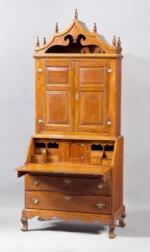The MESDA Journal(www.mesdajournal.org) has published groundbreaking research on early southern decorative arts and material culture since 1975. Articles in the MESDA Journal are available free of charge through its website, as are digital versions of past issues published over the last forty-three years.
 A recent issue discusses “Friendly Furniture in the Early South,” a reference to The Religious Society of Friends, better known as the Quakers. The Quakers had a notable but sometimes overlooked influence on the settlement and material landscape of the early American South. The furniture making traditions of two Quaker communities in the South—one in the northern Shenandoah Valley of Virginia and the other in Piedmont North Carolina—are explored and contextualized in significant new articles published in the Journal.
A recent issue discusses “Friendly Furniture in the Early South,” a reference to The Religious Society of Friends, better known as the Quakers. The Quakers had a notable but sometimes overlooked influence on the settlement and material landscape of the early American South. The furniture making traditions of two Quaker communities in the South—one in the northern Shenandoah Valley of Virginia and the other in Piedmont North Carolina—are explored and contextualized in significant new articles published in the Journal.
Quaker cabinetmaking families that made furniture over a ninety-year span in the Winchester region of Virginia are revealed in an article by A. Nicholas Powers, curator at the Museum of the Shenandoah Valley. Quaker settlement of the area began in the 1730s and a third of the woodworkers documented as working in Winchester and Frederick County before the American Revolution can be identified as members of the Society of Friends. From the Scots-born joiner Alexander Ross working in the first half of the 18th century to the Fawcett family of furniture makers working into the 19th century, Quaker woodworkers were formative settlers and residents of the northern Shenandoah Valley.
A network of ideas and trade that spanned the length of the Great Wagon Road connected the Virginia Quakers with Friends from Philadelphia south to Piedmont North Carolina, where Robert Leath, MESDA’s Chief Curator and VP of Collections & Research, thoughtfully explains the stylistic influences of three separate migration patterns in Guildford County, North Carolina. Leath establishes in his article that Quaker cabinetmakers in Guilford County produced decorative furniture between 1775 and 1825 that reflected their ethnic origins and professional training but also created a regional identity that trumped religious faith. A recently discovered shop ledger book and adept genealogical research skills allow Leath to reconsider long established attributions of surviving furniture and better identify the cabinetmakers working within Piedmont North Carolina’s Quaker communities. Thomas Pierce, a Pennsylvania-born craftsman who migrated in the 1770s, and his apprentice David Osborne have been revealed as the earliest Quaker cabinetmakers in the region and work previously assigned to Jesse Needham has been re-attributed to Henry Macy, who was born on Nantucket Island and moved to Piedmont North Carolina with his family in the 1780s.
